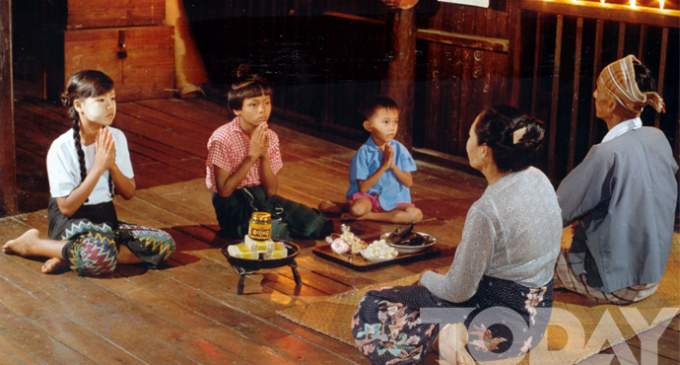THE SPIRIT OF THADINGYUT

Sunny days after rains.
“Only a few days to Thadingyut, and the skies are still hang-ing low with dark clouds. “Such is the thought that hangs over us as the end of the lenten season draws near.
We have had enough of the torrential rains and the accompanying hazards, like colds and influenza. Forgotten are the days when we prayed for showers as we were scorched by the blazing April heat. We longed for rain then, as if we never know that the beautiful drizzle scintillating in the rays of sunshine would later be a murky sheet of torrents that confronted us almost every day for four months.
Now, we long for days warm and dry with lots of sun-shine, when our mildewed clothes will have an airing. Perhaps I should not be too wrapped up (both literally and figuratively) in mildewed clothes and too preoccupied with the thought of turning the house inside out for cleaning; for, it is the time women do the ‘spring’ cleaning, or rather Thandingyut cleaning.
Full-moon day 2,500 years ago
I do try my best to raise myself from such mundane thoughts. “Forget your damp milde-wed things for a while, “I told myself, “just think how it must have looked on the full-moon day of Thadingyut, twenty-five hundred years ago.”
It was when the Buddha, after spending the lenten season at the celestial abode, preach-ing his mother, now reborn as a celestial being, came down to the abode of the humans. Attend-ed by an entourage of celestials, the Buddha descended by the bejewelled ladder, as the heavenly music mingled with the boisterous gusto of the drums and flutes, that the earth-bound humans played to welcome the Buddha.
This self-same scene is recreated during the Thadingyut festival when we have illumina-tions all over the cities, small towns and villages. There will be lots of festivities with music, songs and dancing, for here in our land everything goes with music. The colloquial idiom, which may be rendered in English as, ‘without the benefit of the orchestra’ (qdkif;rygAHkryg), is used to describe any event that is uninteresting, unheralded and not properly enhanced.
A month of weddings
Skies begin to clear and hope springs in my breast, as sun-beams spill out of the clouds. Silver embossed cards pour in. “Wedding, weddings and more weddings”, I muttered happily. How young lovers must have welcomed this season, for marriages are tabooed during the lent.
Of course, many modern young people try to ignore the custom and insist on getting married during the lent. After all, this taboo originated from social and economic conditions of the bygone day, when communications were difficult during the rains; and the people were busy in the fields, so it was prudent to wait till Thadingyut.
Even then, wedding during the lent are still rare. Most lovers would rather wait for Thadin-gyut than risk raised eyebrows at the uncom-mon hurry to get married during the lent.
Anyway, it is more fun to begin one’s married life amidst festivities. Illumination, music, songs and dancing will be all over the town. In some quarters, people collect donations to decorate their streets with festoons of electric lights. Amateur dancing and music troupes are organi-sed to give free entertainment to the spectators.
Lights Festival in the country
Personally speaking, I think Thadingyut is more fun in small towns and villages, a partiality perhaps, since I hailed from a small town myself. Living here amidst the blare of amplifiers and electric lights, I often long for the seemee lights; they are small earthen saucers filled with sesa-mum oil wherein pieces of cotton are used as wicks. Little tongues of flame quivering in the bleeze lend an uncanny beauty to the scene steeped in the silvery beam of the full moon.
More friendly and intimate
Festivities in small towns and villages are more friendly and intimate. The entertainment troupes may not be star-studded, with film stars and well known vocalists taking part, but there is a lot of love and appreciation. The girl with all the make-up and sequinned costume, pretending to be a prima donna, is the snub nosed girl next door. You think she is wonderful, even if she sings a little off key and her dancing not exactly professional.
In small towns, you are personally involved in the festive celebrations, and you care a good deal because everyone is your friend. In big cities, however, you can hardly feel that it is your festival, there is too much noise and glare and you do not know who is who in the celebrations.
Perhaps, I am just a complaining old fogey, but I can hardly see the spirit of Thadingyut in the noisy gaudiness and ostentations of the city festival.
A season of remembrance and Kadaw
There is a silver lining, though. Towards the close of the day before the twilight deepens into night, groups of young people and children can be seen walking with candles and gifts in their hands. They are going round to pay respects to their grand-parents or elderly relatives and teachers. Thadingyut is also a season of rem- embrance, a kadaw season.
I cannot think of an English equivalent for the Myanmar word kadaw: it is more than pay-ing respects or doing obeisance. One raises clasped hands to the forehead and crouches humbly at the feet of the parents, elders and teachers, in the same way one does to worship the Buddha, the Dhamma and the Samgha. This is to kadaw, to be humble and reverent, remem-bering with gratitude all that one owes to parents and teachers, and what is more, desiring to be purged of all the trespasses that might have been committed by word, thought or deed.
The reverent posture of crouching with clasped hands raised to the forehead should not be mistaken for servility, for it is not something that is forced or compelled. It is a voluntary act of honour to whom honour is due. This is the true spirit of Thadingyut.
Khin Myo Chit
./wp-content/uploads/2018/10/Emirate-Online-TDY.png)


















There are no comments at the moment, do you want to add one?
Write a comment